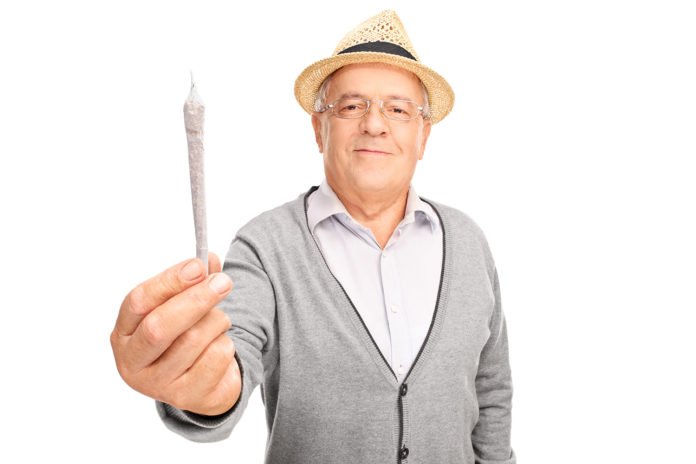Baby Boomers, or those born prior to 1965, aren’t babies anymore but they are the fastest growing consumer demographic for cannabis products. Media reports and academic studies attribute the trend toward (literally) maturing markets and increased public acceptance of cannabis use, as legalization continues to expand across the U.S.
But Boomers aren’t the only group getting cannabis-friendly. Customers in their 70s and 80s, or those born in the years right after World War Two (and prior), are also increasingly using cannabis products, primarily, to treat symptoms of advancing age.
Here’s some expert tips on how to welcome more mature cannabis clientele to your dispensary:
1. Educate sales staff.
Lonnie Painter is the former director of now-defunct Laguna Woods Medical Cannabis Collective (LWMCC), a collective that operated from 2009 until 2018, and served the city of Laguna Woods, California.
The city is made up primarily of the senior community of Laguna Woods Village, and was the first city in Orange County to approve medical marijuana dispensaries. The median age in Laguna Woods during the 2000 Census was 78 years old. The collective was effectively disbanded when the state’s recreational cannabis laws came into effect.
“So you can’t be giving recommendations based on an urban myth. Education, education, education, that’s it. Seniors, my experience–I’m 73 years old, I’ve been using cannabis on and off for over 50 years. I didn’t realize all of the medical benefits, all of its potential, until I really started studying this about ten years ago,” Painter emphasized.
He completed courses at nonprofit Society of Cannabis Clinicians, which offers “continuing education for medical personnel and other professionals, in the medicinal use of cannabis.”
Specifically, Painter pointed out the current boom in CBD-infused products, many of which have been attributed with near-miraculous potential to treat nearly every common medical malady. Too many under-educated budtenders and product vendors, he felt, recommend products to seniors that are ineffective and costly.
If senior citizens are a significant population for you and you’d like to attract loyal, repeat sales, it would be worth the investment to have a designated staff member go through specialized training on the endocannabinoid system, how cannabinoids work, their effects, as well as potential for drug interactions and correct dosing.
Elderly patients especially, are using cannabis products specifically to treat medical conditions and require a higher level of customer service. They also should discuss with their personal physician, any serious medical questions–though many doctors also are under-educated about cannabis use.
2. Carry effective products that seniors prefer.
Painter also bemoaned the lack of appropriate products found in dispensaries for senior patients with ailments like neuropathic pain, cancer, and other serious conditions. LWMCC supplied its members with organic flower and extracted its own concentrates, in cooperation with Northern California growers.
He said elderly patients prefer tinctures, capsules, and topicals. Dosing can vary greatly between levels of tolerance, as well as the differing effects on each individual. Seniors should carefully monitor effects, in order to pinpoint which products are working for them and to avoid any adverse effects.
Like other experts, Painter felt that CBD products were ineffective without a blend of other cannabinoids, including THC, to optimize the “entourage effect” from full spectrum oils and extracts.
A recent study followed 204 elderly patients that were treated with sublingual drops containing varying ratios of CBD to THC. Researchers at the Dent Neurological Institute in Amherst, New York, found that treatment with a 1:1 (THC to CBD) cannabis tincture was most effective, with the least side effects.
Fifty percent of the study subjects reported less pain, and 70 percent indicated they felt “better.” Researchers concluded that cannabis treatment might help some seniors discontinue opioid medications for pain.
3. Set up special events and, if possible, a shuttle.
T’Oakland (pronounced “Toke-land”) Senior Canna Club last week was featured in Oakland Magazine. The club’s members meet to talk about cannabis topics and socialize.
“I’m 62 and been an advocate of cannabis for a long time,” T’Oakland co-founder Melodye Montgomery told OaklandMagazine.com. “But when I go to cannabis events, they’re mostly geared toward youth. The music. The whole environment. I know people my age who are interested in cannabis but don’t want to go to those events. So, we put together a space for seniors.”
Taking a cue from T’Oakland, dispensaries might set aside one night a month to offer special discounts and demos to seniors in a comfortable setting. Some dispensaries have even offered shuttle service to their locations for seniors that need a ride. It’s best to make pre-arrangements with local senior community representatives or a senior canna club, before showing up with the limo van, though. Dispensaries and vendors should also check with their legal counsel, to make sure any offer of transportation or promotions in is compliance with local and state regulations. Interstate travel should not be allowed.
And if there is no senior canna club in your area, but you see potential–why not start one? Promote your senior events with email reminders, sales, and special giveaways. Seniors love to talk and they use social media, too–and word-of-mouth advertising really helps to build your brand’s credibility with older consumers.
(UPDATE: This post has been updated to reflect recommendations for any vendor to check local and state regulations before offering transportation or special event promotions to any group of customers.)











